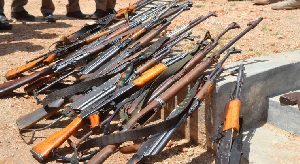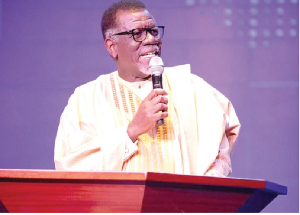- Home - News
- TWI News | TV
- Polls
- Year In Review
- News Archive
- Crime & Punishment
- Politics
- Regional
- Editorial
- Health
- Ghanaians Abroad
- Tabloid
- Africa
- Religion
- Election 2020
- Coronavirus
- News Videos | TV
- Photo Archives
- News Headlines
- Press Release
Business News of Monday, 28 April 2014
Source: The Ghanaian Times
Bonded warehouse tax evaders cough up Ghc320 million

Some tax-evading companies in the bonded warehouse enclave have so far paid a total of GHc320 million towards settling their Indebtedness to the state, The Ghanaian Times can confirm
Presidential Task Force for evading customs duties, in October last year, allegedly uncovered tax fraud amounting to $367 million perpetrated in bonded warehouses against the state by over 280 private and public companies between 2005 and 2012.
Presidential Staffer and member of the Task Force, Dr. Apaak, noted that over GHc 320 million had been retrieved from some of the companies since the ultimatum was given to them in November last year, to pay up the amount evaded.
He said for instance, B5 Plus Limited, one of the companies cited to have evaded tax to the tune of Ghc15,519,729 within the period, had between October 2013 and March 2014 paid GHc 6,641,325.99 to the state.
“Incidentally B5 Plus Limited, a manufacturer, importer and exporter of steel, one of the companies that came out to protest that it had not done anything wrong, happens to be the second highest payer, so far as the records are concerned,” he said.
The Chief Executive Officer of B5 Plus, Mukesh Thakwani, in his defence, explained that, “his company could have been wrongly accused of evading tax because by the nature of the business, some goods moved faster than others, making it possible for some goods imported this year to be cleared while others imported last year or last two years remain in the warehouse”.
Throwing more light on the dealings that took place at the bonded warehouses, Dr. Apaak said under the bonded warehousing regime, importers were allowed to keep their goods in the warehouse under the care and close watch of the Customs Division of the GRA, and when the importer was ready to clear some of the goods, he or she was made to pay the duty in respect of the quantity being cleared before the goods were released.
“Unfortunately in this case, we saw evidence that some of the goods were cleared, but their corresponding duties were not paid to the state,” he said.
He said that could not have happened without the knowledge, connivance or complicity of customs officers.
Dr. Apaak said, that clearly showed the lack of a strict monitoring system to ensure that importers pay duty before clearing their goods from the bonded warehouse.
On measures being put in place to avert future occurrence, he said their work was also to unravel the loopholes in the current system, so that policies could be formulated to deal with them.
“Apart from that, government is looking at the practices elsewhere in the world in order to pick what would suit us, not forgetting the use of technology such as closed circuit television which could ensure real time monitoring of who is doing what, where, when and how, in the bonded warehouse,” he said.
He said the President set up the task force, which has members from diverse backgrounds such as the Ghana Ports and Harbours Authority, Customs, Ministry of Trade, Ministry of Finance among others, to complement the ongoing work by the state agencies.
“In fact, it is to help maximise revenue, plug loopholes in the system and encourage legitimate businesses to continue to operate and pay their taxes to the state,” he said.
He, therefore, advised those whose responsibility it was to serve the public or the state to do so responsibly without fear or favour.
Dr. Apaak said that the government was not opposed to business be it international or local, but it would not condone or protect the unscrupulous ones who compromise public officers to take advantage to exploit the state and deprive it of the needed revenue for development.
A source close to the Criminal Investigations Department (CID) Headquarters said that the payments followed investigations in November last year into dealings in the import business especially, in the area of bonded warehousing.
The source added that the investigations were also expected to fish out officials of the Customs Division of the Ghana Revenue Authority (GRA) under whose watch the anomalies took place.










